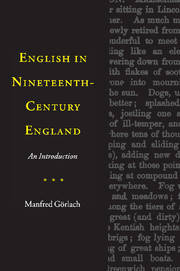Book contents
- Frontmatter
- Contents
- List of abbreviations
- Preface
- Acknowledgements
- List of figures
- List of texts
- 1 Introduction
- 2 Regional and social varieties
- 3 Spelling and pronunciation
- 4 Inflection
- 5 Syntax
- 6 Lexis
- 7 Text types and style
- 8 Provisional conclusions
- 9 Texts
- 10 Information on texts and authors
- References
- Index of names
- Index of topics and titles
- Index of selected words and pronunciations
4 - Inflection
Published online by Cambridge University Press: 17 May 2010
- Frontmatter
- Contents
- List of abbreviations
- Preface
- Acknowledgements
- List of figures
- List of texts
- 1 Introduction
- 2 Regional and social varieties
- 3 Spelling and pronunciation
- 4 Inflection
- 5 Syntax
- 6 Lexis
- 7 Text types and style
- 8 Provisional conclusions
- 9 Texts
- 10 Information on texts and authors
- References
- Index of names
- Index of topics and titles
- Index of selected words and pronunciations
Summary
‘Curiouser and curiouser!’ cried Alice (she was so much surprised that for the moment she quite forgot how to speak good English).
Nouns
The major problems of English inflectional morphology had long been settled – only a few questions in nominal inflection remained to be answered for grammarians of prescriptive grammars in the 19th century. A minor instance of unregulated usage was the genitive marker after stemfinal s; there was still some variation, but the generalization of 's appears to be the rule (as in Tess ‘s, Dickens's). Otherwise, case was (and still is) indicated only in pronouns (cf. 4.3). In plural formation, the distinction between countable and uncountable, i.e. whether a word could be pluralized (and whether a mass noun like acquaintance was to be constructed with a plural form of the verb), was a syntactical concern rather than one of morphology. However, the question of how a plural of a foreign word ought to be formed remained urgent (and is still unsolved), the speaker's competence in the classical languages competing with the tendency to integrate these words in pronunciation and morphology. Henry Fowler (1926, ‘Latin plurals') decides in favour of a ‘foreign’ plural in the case of nuclei, species, theses, opera, antennae; zero plural in forceps; and allows both forms for bacilli, lacunae, genera, and, with semantic distinction, for genii/geniuses. In sum, ‘when one is really in doubt the English form should be given the preference’.
- Type
- Chapter
- Information
- English in Nineteenth-Century EnglandAn Introduction, pp. 65 - 68Publisher: Cambridge University PressPrint publication year: 1999



